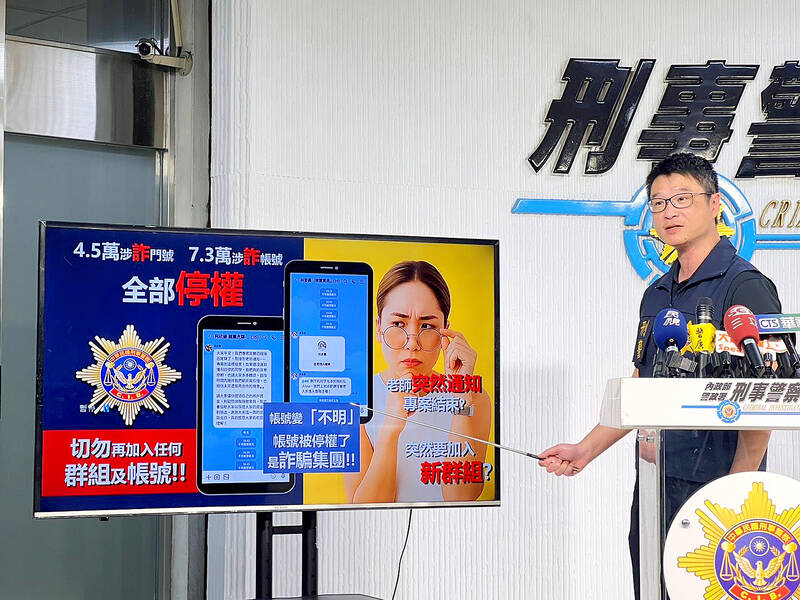The Criminal Investigation Bureau (CIB) has teamed up with Line to crack down on investment scam rings, identifying 45,000 high-risk mobile numbers and deactivating 73,000 suspicious Line accounts.
Police carried out a large-scale, systematic investigation using online surveillance, the CIB said, adding that it would continue blocking any suspicious accounts identified as high-risk for scam activity.
The operation is expected to continue until July 7, the bureau added.

Photo: Chiu Chun-fu, Taipei Times
There has been an uptick of public complaints recently of people joining investment-related Line groups, only for the group to disappear or the members’ account names to change to “unknown,” CIB High-Tech Crime Center Director-General Rufus Lin (林建隆) told a news conference yesterday.
Police warned that these are signs the group is likely run by a scam ring, urging the public to stay alert, not rejoin such groups and refrain from providing personal information or investing money.
Scam groups first post ads on Facebook, Instagram or YouTube offering investments such as stocks or cryptocurrency, Lin said.
Once users click on the ads, they are invited to join a Line group, where scammers impersonate investment advisers or experts and use manipulative language to deceive victims into transferring funds, he added.
Scam artists might create multiple Line groups and use bots to post the same messages across different chats, duping people into believing they have joined a friendly investment network, he said.
The CIB created a task force in early February to work with Line to crack down on such investment scammers, Lin said.
Scammers regularly post on investment groups with stock analyses before market opening or pictures of fun gatherings, and offer stock investment classes to deceive victims, police said.
The CIB investigated thousands of Line accounts suspected of fraudulent activity, finding that the accounts were often registered and deleted within a short time frame.
The bureau previously targeted the backend of scams by identifying low-level operatives and financial flows; however, this latest crackdown aims to limit scam groups’ operations at their source, it said.
The CIB said it would continue cooperating with various companies and industries to crack down on scams and create a safe online environment, protecting the public’s financial safety.
Article 33 of the Fraud Crime Hazard Prevention Act (詐欺犯罪危害防制條例) mandates that operators restrict access to or remove content suspected of fraudulent activity from their platform once they have been notified by the competent authorities.
Line has been systematically removing suspicious accounts since the middle of this month, the company said in a statement.
The company made an ongoing commitment to supporting the government’s anti-fraud initiatives, and pledged to strengthen its internal risk detection and monitoring systems for abnormal behavior, the statement said.
It would continue cross-platform and cross-industry collaborations between the public and private sectors to crack down on fraud, it added.

The manufacture of the remaining 28 M1A2T Abrams tanks Taiwan purchased from the US has recently been completed, and they are expected to be delivered within the next one to two months, a source said yesterday. The Ministry of National Defense is arranging cargo ships to transport the tanks to Taiwan as soon as possible, said the source, who is familiar with the matter. The estimated arrival time ranges from late this month to early next month, the source said. The 28 Abrams tanks make up the third and final batch of a total of 108 tanks, valued at about NT$40.5 billion

Two Taiwanese prosecutors were questioned by Chinese security personnel at their hotel during a trip to China’s Henan Province this month, the Mainland Affairs Council (MAC) said yesterday. The officers had personal information on the prosecutors, including “when they were assigned to their posts, their work locations and job titles,” MAC Deputy Minister and spokesman Liang Wen-chieh (梁文傑) said. On top of asking about their agencies and positions, the officers also questioned the prosecutors about the Cross-Strait Joint Crime-Fighting and Judicial Mutual Assistance Agreement, a pact that serves as the framework for Taiwan-China cooperation on combating crime and providing judicial assistance, Liang

A group from the Taiwanese Designers in Australia association yesterday represented Taiwan at the Midsumma Pride March in Melbourne. The march, held in the St. Kilda suburb, is the city’s largest LGBTQIA+ parade and the flagship event of the annual Midsumma Festival. It attracted more than 45,000 spectators who supported the 400 groups and 10,000 marchers that participated this year, the association said. Taiwanese Designers said they organized a team to march for Taiwan this year, joining politicians, government agencies, professionals and community organizations in showing support for LGBTQIA+ people and diverse communities. As the first country in Asia to legalize same-sex

MOTIVES QUESTIONED The PLA considers Xi’s policies toward Taiwan to be driven by personal considerations rather than military assessment, the Epoch Times reports Chinese President Xi Jinping’s (習近平) latest purge of the Chinese People’s Liberation Army (PLA) leadership might have been prompted by the military’s opposition to plans of invading Taiwan, the Epoch Times said. The Chinese military opposes waging war against Taiwan by a large consensus, putting it at odds with Xi’s vision, the Falun Gong-affiliated daily said in a report on Thursday, citing anonymous sources with insight into the PLA’s inner workings. The opposition is not the opinion of a few generals, but a widely shared view among the PLA cadre, the Epoch Times cited them as saying. “Chinese forces know full well that